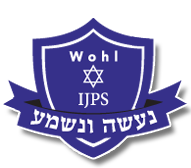JEWISH STUDIES at WIJPS – intent, implementation and impact
Intent:
Our curriculum is planned and sequenced in such a way as to build on prior learning, revise and embed previous topics, and to ensure that the children know more and remember more, in order to be able to do more, as they move through the school, in order to develop confidence in their religious and cultural heritage.
We aim to help children to gain an understanding of contemporary issues such as caring for the environment, the importance of developing positive relationships and the need for respectful behaviour towards others. In this way, children see the link between their Jewish life and the rest of society, preparing them to live confidently within the modern world. We recognise that our pupils need to respect the diversity and richness of other cultures and faiths, however our pupils, who come from all backgrounds, benefit from teaching based firmly on Torah values, which is sensitive to their needs and offered in a non-judgemental way.
Our curriculum documents set out the programme of Jewish education, and detail the knowledge and skills to be gained at each stage of a child’s Jewish education at WIJPS.
Our portrait of a year 6 graduate (see below*) describes what we intend a typical year 6 pupil to know and be able to do at the end of their time at WIJPS.
Implementation:
Jewish studies is formally taught four times a week to KS1 and three times a week to KS2 with one Ivrit lesson per week. In addition, the children have daily tefillah (in class, in phase groups, as a whole school), they say hamotzi and learn to bench daily. They have Kabbalat Shabbat weekly and celebrate the chagim and important days in the Israeli calendar (Yom Ha’atzmaut, Yom HaZikaron, Yom HaShoah etc.
WIJPS pupils learn through four modules:
• Hebrew Language – reading, writing, speaking and listening
• Jewish Way of Life, including the Jewish year
• Tefillah
• Torah (Parasha)
In order for the children of the school to flourish in their learning, we encourage parental commitment and support to our Jewish ethos. Parents are also encouraged to attend festival celebrations and to attend family Jewish learning programmes, where appropriate, to meaningfully support their child/ren.
Impact:
It is crucial for learning to be embedded and to have the potential to move from a child’s head to their heart. Whilst we recognise that Judaism is not a driver in each child’s life at WIJPS (both Jewish and non-Jewish), we expect that their Jewish Studies will be impactful on them in terms of their values and attitudes, conduct and emotional development.
We teach pupils the importance of showing respect and sensitivity towards others and to have an understanding of the world around them, and we prepare them for life in the Jewish and wider community.
Equal Opportunities
• We ensure that all children, irrespective of their ethnicity, attainment and ability, age, disability, gender or background, have equality of access to learning.
• We recognise that children have different learning styles, and we make appropriate provision within the curriculum to ensure that each child receives the widest possible opportunity to develop their skills and abilities.
• We ensure that children learning English as an additional language have full access to the curriculum and are supported as much as possible in their learning.
• We ensure that children with special educational needs are supported as much as possible with their learning.
* Portrait of a WIJPS year 6 graduate
By the time a child leaves WIJPS our aim is that they should:
- have strong moral values
- have pride in their own faith and respect of other religions
- have an understanding of the centrality of Israel within Jewish life
- be confident to play a part in the wider Jewish community and British society as a whole
- be proficient in reading, writing and speaking Hebrew at their own level/according to their ability
- have a good knowledge and understanding of the Jewish way of life, learned through positive formal and informal experiences
Our hope and aspiration is for them to love it, to learn it, to live it – to have a love of JS so as they want to learn it with the hope that in the future they may wish to live it.
For further details, please use the links below:


